Jonny Bowden, Ph.D., C.N.S.
See book keywords and concepts |
 And its medicinal properties, , known and appreciated by herbalists for hundreds of years, are now being confirmed by research.
Some of the health-promoting benefits of rosemary come from two of its constituents, caffeic acid and rosmarinic acid, plus plant compounds like diter-penes and monoterpenes, and antioxidants like vitamin E and assorted flavonoids. The acids are antiinflammatory, and may be helpful in reducing the inflammation that contributes to asthma, liver disease, and heart disease. And its medicinal properties, , known and appreciated by herbalists for hundreds of years, are now being confirmed by research.
Some of the health-promoting benefits of rosemary come from two of its constituents, caffeic acid and rosmarinic acid, plus plant compounds like diter-penes and monoterpenes, and antioxidants like vitamin E and assorted flavonoids. The acids are antiinflammatory, and may be helpful in reducing the inflammation that contributes to asthma, liver disease, and heart disease. |
Mike Adams, the Health Ranger
See article keywords and concepts |
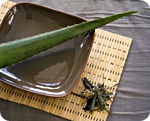 This fact is well known by not just herbalists around the world, but also by anyone with even a hint of common sense. If aloe vera gel wasn't antibacterial, then any little nick or scrape of the aloe plant would result in the whole thing being eaten up by bacteria. Aloe has to be antibacterial simply to survive in the wild! Otherwise, the moist, nutrient-rich gel would be a perfect breeding ground for bacteria.
Aloe vera makes most first aid kits obsolete. You can get rid of all those silly, toxic first aid sprays (antibacteria sprays, lotions, bandages, etc. This fact is well known by not just herbalists around the world, but also by anyone with even a hint of common sense. If aloe vera gel wasn't antibacterial, then any little nick or scrape of the aloe plant would result in the whole thing being eaten up by bacteria. Aloe has to be antibacterial simply to survive in the wild! Otherwise, the moist, nutrient-rich gel would be a perfect breeding ground for bacteria.
Aloe vera makes most first aid kits obsolete. You can get rid of all those silly, toxic first aid sprays (antibacteria sprays, lotions, bandages, etc. |
Mike Adams, the Health Ranger
See article keywords and concepts |
 Shamans, medicine women, herbalists, midwives and healers are all engaged in quackery based on superstition or voodoo.
There is no such thing as bioenergy, intuition, mind-body medicine, quantum physics or therapeutic touch. The entire universe operates only on the physical and chemical levels. There is nothing beyond those two levels yet to be discovered or explored.
We already know everything there is to know. No new discoveries are necessary, nor are any paradigm shifts in scientific medicine. Shamans, medicine women, herbalists, midwives and healers are all engaged in quackery based on superstition or voodoo.
There is no such thing as bioenergy, intuition, mind-body medicine, quantum physics or therapeutic touch. The entire universe operates only on the physical and chemical levels. There is nothing beyond those two levels yet to be discovered or explored.
We already know everything there is to know. No new discoveries are necessary, nor are any paradigm shifts in scientific medicine. |
Mike Adams, the Health Ranger
See article keywords and concepts |
 Traditional herbalists -- whether they're Native American, Aborigine, Australian, South American, Incan, Mayan or from any other culture -- would ask plants for permission when they harvested them from the natural environment. They would thank the plant when they took its leaves, roots, or flowers, or rhizomes. Today our corporations say, "We own the planet, and we'll take what we want. We'll punish anybody else who tries to grow this plant because we own its intellectual property. Traditional herbalists -- whether they're Native American, Aborigine, Australian, South American, Incan, Mayan or from any other culture -- would ask plants for permission when they harvested them from the natural environment. They would thank the plant when they took its leaves, roots, or flowers, or rhizomes. Today our corporations say, "We own the planet, and we'll take what we want. We'll punish anybody else who tries to grow this plant because we own its intellectual property. |
Thomson Healthcare, Inc.
See book keywords and concepts |
 Traditional Herbalist's Prescriptions for Common Clinical Conditions: A Survey of Members of the UK National Institute of Medicinal herbalists. Phytother Res. 12 (5); 369-371. 1998
Broda B, Grzybek J. Preparation of herbal mixtures / Studies on herbs with designed sedative activity. Z Phytother. 14; 307-314. 1993
Buzogany K, Cucu V, Accumulation, distribution and conservation dynamics of iridoids in Leonurus cardiaca L. and L. villosus Desf. In: Farmacia (Bukarest): 34(3): 173-176. 1986.
Kartnig T, Gruber A, Menzinger S. Flavonoid-O-Glycosides from the Herbs of Leonurus cardiaca. J Nat Prod. Traditional Herbalist's Prescriptions for Common Clinical Conditions: A Survey of Members of the UK National Institute of Medicinal herbalists. Phytother Res. 12 (5); 369-371. 1998
Broda B, Grzybek J. Preparation of herbal mixtures / Studies on herbs with designed sedative activity. Z Phytother. 14; 307-314. 1993
Buzogany K, Cucu V, Accumulation, distribution and conservation dynamics of iridoids in Leonurus cardiaca L. and L. villosus Desf. In: Farmacia (Bukarest): 34(3): 173-176. 1986.
Kartnig T, Gruber A, Menzinger S. Flavonoid-O-Glycosides from the Herbs of Leonurus cardiaca. J Nat Prod. |
| Traditional Herbalist's Prescriptions for Common Clinical Conditions: A Survey of Members of the UK National Institute of Medicinal herbalists. Phytother Res. 12 (5); 369-371. 1998
Franz G, Madaus A, Stabilitat von Polysaccharides Untersuchungen am Beispiel des Eibischschleims. In: DAZ 130(40):2194. 1990.
Gudej J. Flavonoids, Phenolic Acids and Coumarins from the Roots of Althaea officinalis. Planta Med. 57; 284-285. 1991.
Hahn-Deinstrop E, Eibischwurzel Identifizierung von Eibischwurzel-Extrakt und Gehaltsbestimmung in einem Instant-Tee. In: DAZ 135(13): 1147-1149. 1995. |
Brigitte Mars, A.H.G.
See book keywords and concepts |
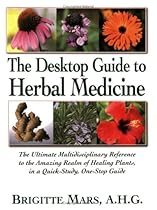 Echinacea can be taken frequently (every couple of hours) during acute infection, but this sort of dosing should be undertaken only for a few days. herbalists disagree about the effectiveness of the herb's long-term use; many recommend taking it for cycles of ten days to three weeks, with breaks in between, while others recommend it for continuous long-term use.
Although echinacea can often be used in place of antibiotics, it does not strongly affect the genito-urinary system, so don't rely on it to treat infections for that part of the body. Echinacea can be taken frequently (every couple of hours) during acute infection, but this sort of dosing should be undertaken only for a few days. herbalists disagree about the effectiveness of the herb's long-term use; many recommend taking it for cycles of ten days to three weeks, with breaks in between, while others recommend it for continuous long-term use.
Although echinacea can often be used in place of antibiotics, it does not strongly affect the genito-urinary system, so don't rely on it to treat infections for that part of the body. |
Jonny Bowden, Ph.D., C.N.S.
See book keywords and concepts |
 Coconut Oil Is a Natural Remedy with Antioxidant Powers
In his seminal book Medicinal Plants of the World, the dean of American herbalists, James Duke, wrote that coconut and coconut oil are used as folk remedies to treat more than thirty-five ailments, from abscesses to wounds. And it's well known that the absorption of calcium, magnesium, and also amino acids has been found to increase when infants are fed a diet using coconut oil. Coconut oil also has substantial antioxidant power. And populations that consume coconuts as a major part of their diets are rarely troubled by osteoporosis. Coconut Oil Is a Natural Remedy with Antioxidant Powers
In his seminal book Medicinal Plants of the World, the dean of American herbalists, James Duke, wrote that coconut and coconut oil are used as folk remedies to treat more than thirty-five ailments, from abscesses to wounds. And it's well known that the absorption of calcium, magnesium, and also amino acids has been found to increase when infants are fed a diet using coconut oil. Coconut oil also has substantial antioxidant power. And populations that consume coconuts as a major part of their diets are rarely troubled by osteoporosis. |
David Winston, RH(AHG), and Steven Maimes
See book keywords and concepts |
 In addition, many herbalists and other health care practitioners are sharing their clinical experiences with medicinal herbs in their professional journals and literature. It is our belief that a good clinical herbalist always should be a part of any medicinal plant research team.
EFFICACY AND SAFETY OF PHARMACEUTICAL DRUGS
There is always the question of efficacy—does the medicine work? The following chart provides estimates of how effective pharmaceutical drugs are for treating people with various illnesses or diseases. The range is from 25 to 60 percent effective. In addition, many herbalists and other health care practitioners are sharing their clinical experiences with medicinal herbs in their professional journals and literature. It is our belief that a good clinical herbalist always should be a part of any medicinal plant research team.
EFFICACY AND SAFETY OF PHARMACEUTICAL DRUGS
There is always the question of efficacy—does the medicine work? The following chart provides estimates of how effective pharmaceutical drugs are for treating people with various illnesses or diseases. The range is from 25 to 60 percent effective. |
Brenda Watson and Leonard Smith
See book keywords and concepts |
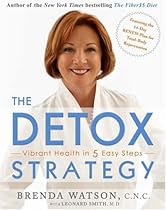 Although there are five primary organs of elimination in the body, both herbalists and practitioners of modern medicine agree that the liver is the primary organ of detoxification. It's the main hub where toxins are transformed, dismantled, neutralized, or reassembled to hopefully be eliminated through one of the four channels of absolute elimination: the lungs, the intestines, the skin, and the urine. If you have any weakness or debility in your liver, it will impact every other organ or system. Although there are five primary organs of elimination in the body, both herbalists and practitioners of modern medicine agree that the liver is the primary organ of detoxification. It's the main hub where toxins are transformed, dismantled, neutralized, or reassembled to hopefully be eliminated through one of the four channels of absolute elimination: the lungs, the intestines, the skin, and the urine. If you have any weakness or debility in your liver, it will impact every other organ or system. |
David Winston, RH(AHG), and Steven Maimes
See book keywords and concepts |
 In contrast, most herbalists have been taught to view all evidence (traditional, ethnobotanical, historical, observational, and scientific) when gaining insight into the safety, efficacy, and therapeutic potential of herbal medicine.
Related to evaluating efficacy is the issue of safety. The classic definition of an herbal adaptogen includes a lack of toxicity. It is remarkable to know that all adaptogens are relatively safe. It must also be said that all substances can have harmful effects under extreme conditions such as very high doses or chronic patterns of misuse. In contrast, most herbalists have been taught to view all evidence (traditional, ethnobotanical, historical, observational, and scientific) when gaining insight into the safety, efficacy, and therapeutic potential of herbal medicine.
Related to evaluating efficacy is the issue of safety. The classic definition of an herbal adaptogen includes a lack of toxicity. It is remarkable to know that all adaptogens are relatively safe. It must also be said that all substances can have harmful effects under extreme conditions such as very high doses or chronic patterns of misuse. |
Brigitte Mars, A.H.G.
See book keywords and concepts |
 Julius Caesar recommended it as an antidote to poisons, while seventeenth-century English herbalists recommended it to help expel the placenta after childbirth. Early European settlers brought the plant to the New World, where it quickly naturalized and found use among Native Americans; the Navajo, for example, used it to ease childbirth.
Horehound mildly stimulates cardiopulmonary activity, encourages the body to expel phlegm, clears heat and toxins, and deters infection. The essential oils in horehound help dilate the arteries and relieve lung congestion. Julius Caesar recommended it as an antidote to poisons, while seventeenth-century English herbalists recommended it to help expel the placenta after childbirth. Early European settlers brought the plant to the New World, where it quickly naturalized and found use among Native Americans; the Navajo, for example, used it to ease childbirth.
Horehound mildly stimulates cardiopulmonary activity, encourages the body to expel phlegm, clears heat and toxins, and deters infection. The essential oils in horehound help dilate the arteries and relieve lung congestion. |
Dan Buettner
See book keywords and concepts |
 We identified gerontologists, demographers, herbalists, shamans, and priestesses to contact, as well as centenarians themselves, who were living emblems of Okinawan longevity.
Each morning our online audience voted to decide whom we should interview and where the team should focus its research. Each night we reported back to the audience with a variety of dispatches and short videos. We identified gerontologists, demographers, herbalists, shamans, and priestesses to contact, as well as centenarians themselves, who were living emblems of Okinawan longevity.
Each morning our online audience voted to decide whom we should interview and where the team should focus its research. Each night we reported back to the audience with a variety of dispatches and short videos. |
Dr Ron Roberts
See book keywords and concepts |
 This drawback has been overcome by the development of odourless garlic capsules or tablets, although some herbalists feel that these are less effective than the fresh clove. Capsules are widely available at pharmacies and health food shops, where you may also find garlic combined with horseradish, which is one of the best safeguards against colds, influenza, asthma and respiratory problems. This drawback has been overcome by the development of odourless garlic capsules or tablets, although some herbalists feel that these are less effective than the fresh clove. Capsules are widely available at pharmacies and health food shops, where you may also find garlic combined with horseradish, which is one of the best safeguards against colds, influenza, asthma and respiratory problems. |
David Winston, RH(AHG), and Steven Maimes
See book keywords and concepts |
 CLINICAL USE OF ADAPTOGENS IN EQUINE VETERINARY PRACTICE
A selection of case histories from botanical veterinarians and animal herbalists treating horses are discussed in this section.
From Stacey Small's Case Files—Repressed Immune System
Stacey Small is a graduate of David Winston's Center of Herbal Studies two-year herbal training program. She is the founder of Equilite, Inc., a manufacturer of herbal products for horses, and copublisher of Holistic Horse magazine.
Small relates a case in which she was called by a frustrated trainer to discuss a thoroughbred filly that he had. CLINICAL USE OF ADAPTOGENS IN EQUINE VETERINARY PRACTICE
A selection of case histories from botanical veterinarians and animal herbalists treating horses are discussed in this section.
From Stacey Small's Case Files—Repressed Immune System
Stacey Small is a graduate of David Winston's Center of Herbal Studies two-year herbal training program. She is the founder of Equilite, Inc., a manufacturer of herbal products for horses, and copublisher of Holistic Horse magazine.
Small relates a case in which she was called by a frustrated trainer to discuss a thoroughbred filly that he had. |
Roberta Bivins
See book keywords and concepts |
 Orthodox western doctors had little to offer their patients—and they were struggling in a fiercely competitive marketplace against homeopaths, herbalists, and aboriginal healers, as well as the tiny Chinese medical community, and the behemoth of self-medication. When the mainstream press started reporting Chinese success in treating the disease, Western physicians faced not only a loss of market share, but a loss of face: a defeat at the hands of a medical system they saw as the superstitious quackery of an inferior culture. Orthodox western doctors had little to offer their patients—and they were struggling in a fiercely competitive marketplace against homeopaths, herbalists, and aboriginal healers, as well as the tiny Chinese medical community, and the behemoth of self-medication. When the mainstream press started reporting Chinese success in treating the disease, Western physicians faced not only a loss of market share, but a loss of face: a defeat at the hands of a medical system they saw as the superstitious quackery of an inferior culture. |
David Winston, RH(AHG), and Steven Maimes
See book keywords and concepts |
 Thus, herbalists believe the historical basis for consuming ginseng is still relevant, with or without scientific collaboration. This argument can be made for most of the different adaptogens. However, in many cases more clinical research is needed to confirm results and to gain the acceptance of the medical community.
Why Many Published Research Findings Are False
"The great majority of published research is so deeply flawed that it should be considered essentially worthless. Thus, herbalists believe the historical basis for consuming ginseng is still relevant, with or without scientific collaboration. This argument can be made for most of the different adaptogens. However, in many cases more clinical research is needed to confirm results and to gain the acceptance of the medical community.
Why Many Published Research Findings Are False
"The great majority of published research is so deeply flawed that it should be considered essentially worthless. |
Andreas Moritz
See book keywords and concepts |
 There is an effort on behalf of certain well-known herbalists, doctors, and establishments to discredit the beneficial effects of the liver cleanse by stating that these gallstones are actually "soap stones" made of olive oil or are produced by the liver in response to the sudden ingestion of large quantities of olive oil. These individuals have their own reasons for making such statements, which is not for me to comment on. They have obviously never done a liver cleanse themselves. Otherwise they would realize what these stones are made of and what happens to their body when they release them. There is an effort on behalf of certain well-known herbalists, doctors, and establishments to discredit the beneficial effects of the liver cleanse by stating that these gallstones are actually "soap stones" made of olive oil or are produced by the liver in response to the sudden ingestion of large quantities of olive oil. These individuals have their own reasons for making such statements, which is not for me to comment on. They have obviously never done a liver cleanse themselves. Otherwise they would realize what these stones are made of and what happens to their body when they release them. |
Dr Ron Roberts
See book keywords and concepts |
 Herbs are seldom used singularly, herbalists preferring to prescribe a number together. This is because they are often treating several symptoms, not just one. For instance, when someone with asthma consults a herbalist he or she may be prescribed herbs to cut down on mucus production, herbs to ease bronchospasms and coughing, and herbs to build up the immune system—for, as we have seen, a strong and robust immune system lessens the likelihood of severe asthma occurring.
Most herbal suppliers provide combination formulas developed specially for asthma, which contain a number of herbs. Herbs are seldom used singularly, herbalists preferring to prescribe a number together. This is because they are often treating several symptoms, not just one. For instance, when someone with asthma consults a herbalist he or she may be prescribed herbs to cut down on mucus production, herbs to ease bronchospasms and coughing, and herbs to build up the immune system—for, as we have seen, a strong and robust immune system lessens the likelihood of severe asthma occurring.
Most herbal suppliers provide combination formulas developed specially for asthma, which contain a number of herbs. |
David Winston, RH(AHG), and Steven Maimes
See book keywords and concepts |
 One used a product made from the leaf juice (the root is what is usually used) that was five times more dilute than what the vast majority of American herbalists use. It was no surprise to many that the study showed no or little activity. In the second study, researchers used what was probably an effective echinacea product, but the dose was only one-quarter to one-third of what would be considered an adequate therapeutic dose. It, too, was found to be ineffective. This study was comparable to giving someone one-half of an aspirin and wondering why he still has a headache. One used a product made from the leaf juice (the root is what is usually used) that was five times more dilute than what the vast majority of American herbalists use. It was no surprise to many that the study showed no or little activity. In the second study, researchers used what was probably an effective echinacea product, but the dose was only one-quarter to one-third of what would be considered an adequate therapeutic dose. It, too, was found to be ineffective. This study was comparable to giving someone one-half of an aspirin and wondering why he still has a headache. |
Roberta Bivins
See book keywords and concepts |
 Chances are that you'll see ads for meditation, acupuncture, herbal supplements, and T'ai Chi classes, alongside the business cards of homeopaths and naturopaths, faith healers and Chinese herbalists. Prominent medical and scientific journals begrudge what they see as ill-considered enthusiasm for such 'heterodox' or 'alternative' therapies, and mourn the lost lustre of orthodox medicine.1 Many orthodox practitioners berate patients for their 'flight from reason', while a smaller group adopts aspects or styles of alternative practice themselves. Chances are that you'll see ads for meditation, acupuncture, herbal supplements, and T'ai Chi classes, alongside the business cards of homeopaths and naturopaths, faith healers and Chinese herbalists. Prominent medical and scientific journals begrudge what they see as ill-considered enthusiasm for such 'heterodox' or 'alternative' therapies, and mourn the lost lustre of orthodox medicine.1 Many orthodox practitioners berate patients for their 'flight from reason', while a smaller group adopts aspects or styles of alternative practice themselves. |
Pam Montgomery
See book keywords and concepts |
 When you engage Mugwort's Artemis essence she becomes your protectress against negative energies and "evil spirits," as the old time herbalists say.
Mugwort has also been called St. John's Girdle, and it is said that John the Baptist wore a girdle of mugwort while in the wilderness. Was this because he knew mugwort would protect him or was it to help him open his third eye and intuition, to bring him close to spirit through his visions, another way of entering the dreamtime? When you engage Mugwort's Artemis essence she becomes your protectress against negative energies and "evil spirits," as the old time herbalists say.
Mugwort has also been called St. John's Girdle, and it is said that John the Baptist wore a girdle of mugwort while in the wilderness. Was this because he knew mugwort would protect him or was it to help him open his third eye and intuition, to bring him close to spirit through his visions, another way of entering the dreamtime? |
David Winston, RH(AHG), and Steven Maimes
See book keywords and concepts |
 In clinical practice, I and thousands of other herbalists, naturopathic physicians, and even a few mainstream medical doctors use skullcap safely and regularly. It is indicated for stressed-out people who, when nervous or agitated, develop muscle spasms, nervous tics, or tight, painful muscles.
I also use skullcap for the spasms and tremors associated with tardive dyskinesia (involuntary movements of the muscles and tongue), restless legs syndrome, mild Tourette's syndrome, and bruxism (grinding of the teeth). It even can offer some relief from the tremors caused by Parkinson's disease. In clinical practice, I and thousands of other herbalists, naturopathic physicians, and even a few mainstream medical doctors use skullcap safely and regularly. It is indicated for stressed-out people who, when nervous or agitated, develop muscle spasms, nervous tics, or tight, painful muscles.
I also use skullcap for the spasms and tremors associated with tardive dyskinesia (involuntary movements of the muscles and tongue), restless legs syndrome, mild Tourette's syndrome, and bruxism (grinding of the teeth). It even can offer some relief from the tremors caused by Parkinson's disease. |
David Wolfe
See book keywords and concepts |
 For centuries, herbalists have told us of the beneficial effects of hot "cayenne" peppers in healing heart conditions. Hot peppers are also great for stimulating the digestive tract and for "burning" out parasites in the intestines. These foods are natural antibiotics and they contain an excellent quantity of liver-supporting sulfur. (The type of sulfur needed to produce glowing skin, hair and nails, is of another type found in aloe vera, spirulina, hempseed and MSM powder). For centuries, herbalists have told us of the beneficial effects of hot "cayenne" peppers in healing heart conditions. Hot peppers are also great for stimulating the digestive tract and for "burning" out parasites in the intestines. These foods are natural antibiotics and they contain an excellent quantity of liver-supporting sulfur. (The type of sulfur needed to produce glowing skin, hair and nails, is of another type found in aloe vera, spirulina, hempseed and MSM powder). |
Michael Friedman, ND
See book keywords and concepts |
 Astragalus may not be well indicated for acute illness because it "locks the gates," not allowing entrance or exit from the body, although this view is certainly not held by all herbalists.
Adrenal Support: Astragalus is a warming and sweet herb. In addition to a tonic adrenal effect, astragalus also has an affinity for the lungs and spleen.
Pharmacology: Astragalus contains glycosides, polysaccharides, choline, betaine, rumatakenin, beta-sitos-terol, isoflavones, and selenium. Astragalus may not be well indicated for acute illness because it "locks the gates," not allowing entrance or exit from the body, although this view is certainly not held by all herbalists.
Adrenal Support: Astragalus is a warming and sweet herb. In addition to a tonic adrenal effect, astragalus also has an affinity for the lungs and spleen.
Pharmacology: Astragalus contains glycosides, polysaccharides, choline, betaine, rumatakenin, beta-sitos-terol, isoflavones, and selenium. |
by Michael Murray, N.D. and Joseph Pizzorno, N.D.
See book keywords and concepts |
| Modern herbalists rarely mention arugula's aphrodisiac qualities, instead recommending its warming nature as an aid to the fires of digestion.
Arugula has been cultivated by the British for centuries and was brought to America by the colonists, who planted it in the earliest gardens in New England. Today, in addition to its growing popularity in the United States, arugula is a favored green in Italy, France, Spain, Greece, and Egypt. In India, arugula leaves are not used, and the plant is grown primarily for the oil derived from its seeds. |
| This latter effect is the reason many herbalists recommend that pregnant and nursing women avoid sage.
HOW TO SELECT AND STORE
Whenever possible, choose fresh sage over the dried form of the herb, since it is superior in flavor. The leaves of fresh sage should be a vibrant silver-green in color and free from dark spots or yellowing. To store fresh sage leaves, carefully wrap them in a damp paper towel and place inside a loosely closed plastic bag. Store in the refrigerator, where they should stay fresh for several days.
If fresh sage is not available, choose dried. |
Mike Adams, the Health Ranger
See article keywords and concepts |
 I can probably identify maybe 100 to 200 herbs by their signature characteristic, but the good people who really are the top herbalists can identify over 1,000. For example, think of peppermint tea. If you have two batches of peppermint, and you brew them up and one tastes like dishwater while the other has a really strong peppermint flavor, you don' t have to be an herbalist to say, "That's good peppermint, and that's not." The signature characteristic of peppermint is the peppermint flavor. The signature characteristic of echinacea is that it numbs and tingles the mouth. I can probably identify maybe 100 to 200 herbs by their signature characteristic, but the good people who really are the top herbalists can identify over 1,000. For example, think of peppermint tea. If you have two batches of peppermint, and you brew them up and one tastes like dishwater while the other has a really strong peppermint flavor, you don' t have to be an herbalist to say, "That's good peppermint, and that's not." The signature characteristic of peppermint is the peppermint flavor. The signature characteristic of echinacea is that it numbs and tingles the mouth. |
Mike Adams, the Health Ranger
See article keywords and concepts |
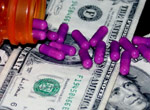 That's why I'm very happy to see the rising popularity of massage therapists, herbalists, nutritionists, acupuncturists and naturopathic physicians -- people who are true healers. That's what we've got to do in this country to turn things around. We've got to base the economy on healing, disease prevention and the education of our population so that as people live longer they can contribute to society in a meaningful way.
I realize this plan would require our national leaders to actually have vision. We need leaders who have vision beyond this generation. That's why I'm very happy to see the rising popularity of massage therapists, herbalists, nutritionists, acupuncturists and naturopathic physicians -- people who are true healers. That's what we've got to do in this country to turn things around. We've got to base the economy on healing, disease prevention and the education of our population so that as people live longer they can contribute to society in a meaningful way.
I realize this plan would require our national leaders to actually have vision. We need leaders who have vision beyond this generation. |
Alan R. Gaby, M.D., Jonathan V. Wright, M.D., Forrest Batz, Pharm.D. Rick Chester, RPh., N.D., DipLAc. George Constantine, R.Ph., Ph.D. Linnea D. Thompson, Pharm.D., N.D.
See book keywords and concepts |
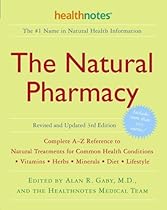 However, many herbalists continue to believe that people with hypertension should avoid Asian ginseng (page 630) and American ginseng (page 625), and, while not a true ginseng, Siberian ginseng (eleuthero [page 672]) as well.
Are there any side effects or interactions?
Refer to the individual herb for information about any side effects or interactions.
Holistic approaches that may be helpful
Anxiety (page 30) in men (but not women) has been linked to development of hypertension.71 Several research groups have also shown a relationship between job strain and high blood pressure in men. However, many herbalists continue to believe that people with hypertension should avoid Asian ginseng (page 630) and American ginseng (page 625), and, while not a true ginseng, Siberian ginseng (eleuthero [page 672]) as well.
Are there any side effects or interactions?
Refer to the individual herb for information about any side effects or interactions.
Holistic approaches that may be helpful
Anxiety (page 30) in men (but not women) has been linked to development of hypertension.71 Several research groups have also shown a relationship between job strain and high blood pressure in men. |












